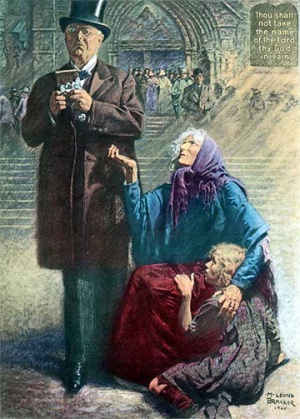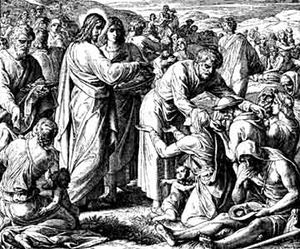Altruism: Difference between revisions
No edit summary |
No edit summary |
||
| Line 15: | Line 15: | ||
Altruism is the opposite of selfishness, and it is the antithesis of coveting. The word was coined by the French philosopher Auguste Comte in French, as altruisme, for an antonym of egoism. He derived it from the Italian altrui, which in turn was derived from Latin ''alteri'', meaning "other people" or "somebody else". | Altruism is the opposite of selfishness, and it is the antithesis of coveting. The word was coined by the French philosopher Auguste Comte in French, as altruisme, for an antonym of egoism. He derived it from the Italian altrui, which in turn was derived from Latin ''alteri'', meaning "other people" or "somebody else". | ||
The distinction within societies is found in what the people do and the way and reason they doo it. | |||
Are they only acting upon what makes them comfortable or are they willing to [[sacrifice]] fhemselves for the well-being of others? | |||
[[Legal charity]] is not altruism but it is a [[covetous practices]] that leads to the debilitation of the [[Masses]]. It is the [[Corban]] of the [[Pharisees]] that made the word of God to none effect from which we were to [[repent]]. | [[Legal charity]] is not altruism but it is a [[covetous practices]] that leads to the debilitation of the [[Masses]]. It is the [[Corban]] of the [[Pharisees]] that made the word of God to none effect from which we were to [[repent]]. | ||
Revision as of 09:31, 7 November 2022

Altruism is the belief in or practice of selfless concern for the well-being of others.
Altruism or selflessness is the principle or practice of concern for the welfare of others. It is a traditional social virtue found in many who are active in the culture of a society which binds itself together with love rather than force.
'Altruism or Charity is a core aspect of a free, prosperous, and healthy society. Charity does not begin with giving away things to others but with asserting a greater effort in all the things you do. If you work for an employer you will give your best so that you earn your wages desiring that employer prospers. If you are an employer you will have equal concern for those who work for you. The essence of this diligence and industry is that you will care about others as much as you care about yourself.
This idea of loving your neighbor as much as yourself is a distinctively religious precept repeated through out history in successful societies.
We find this ritual of altruism promoted in many religions and even some secular states, although the use of force by the states that become collectives has become a worldview of the socialist or more extreme communist states end in disaster. There has always been a well known reason for all charity to be based on the freewill offerings of individual people. The dependence of the "masses" upon legal charity granted by the State may provide services but it erodes the social bonds of society, weakens the poor,[1] and encourages tyrants.
Though the concept of giving to "others" for whom concern should be directed can vary among cultures and religions and all forms of altruism remain an important position of personal sacrifice resulting from individual choice it will always be essential that the key includes the putting the whole well being and condition of others in a place equal to if not more than your own.

Altruism is the opposite of selfishness, and it is the antithesis of coveting. The word was coined by the French philosopher Auguste Comte in French, as altruisme, for an antonym of egoism. He derived it from the Italian altrui, which in turn was derived from Latin alteri, meaning "other people" or "somebody else".
The distinction within societies is found in what the people do and the way and reason they doo it.
Are they only acting upon what makes them comfortable or are they willing to sacrifice fhemselves for the well-being of others?
Legal charity is not altruism but it is a covetous practices that leads to the debilitation of the Masses. It is the Corban of the Pharisees that made the word of God to none effect from which we were to repent.
Government |
Governments |
Civil Government |
Government and Liberty Described |
Social contract |
Covenants of the gods |
Contracts, Covenants and Constitutions |
Nationalism |
Republic |
Democracy |
Minarchism |
Statism |
Fascism |
Tyranny |
Despotism |
Federation
Communism |
Anarcho communism |
Communist Manifesto |
Communist Altruism |
Primitive Communism |
Karl Marx Marriage |
Collectivism |
Altruism |
Saul Syndrome |
Foolishly |
Anarchist |
Capitalism |
Socialism |
Rules For Radicals |
Atheist |
Viable republic |
Republican form |
Titular |
The Way |
Perfect law of liberty |
NAP |
Taxation |
Tribute |
Tithe |
Tithing |
Pay tribute |
Legal charity |
Social Security |
Corban |
Hierarchy |
Imperial Cult of Rome |
The Democracy Cult |
Employ |
Bondage |
Mammon |
Temples |
Cain |
Nimrod |
Pharaoh |
Caesar |
Law |
Mystery Babylon |
Saving Babylon |
Exiting Babylon |
Supreme being |
gods many |
Ideological subversion |
Schools as Tools |
Roots of the Welfare State |
Covetous Practices |
Consent not |
Withdraw consent |
Come out |
Put out |
Cry out |
Voice |
Kingdom of God |
Church legally defined |
Pure Religion |
Christian conflict |
If you need help:
- Or want to help others:
Join The Living Network of The Companies of Ten
The Living Network |
Join Local group |
About |
Purpose |
Guidelines |
Network Removal
Contact Minister |
Fractal Network |
Audacity of Hope |
Network Links
Footnotes
- ↑ "Behold, this was the iniquity of thy sister Sodom, pride, fulness of bread, and abundance of idleness was in her and in her daughters, neither did she strengthen the hand of the poor and needy." Ezekiel 16:49